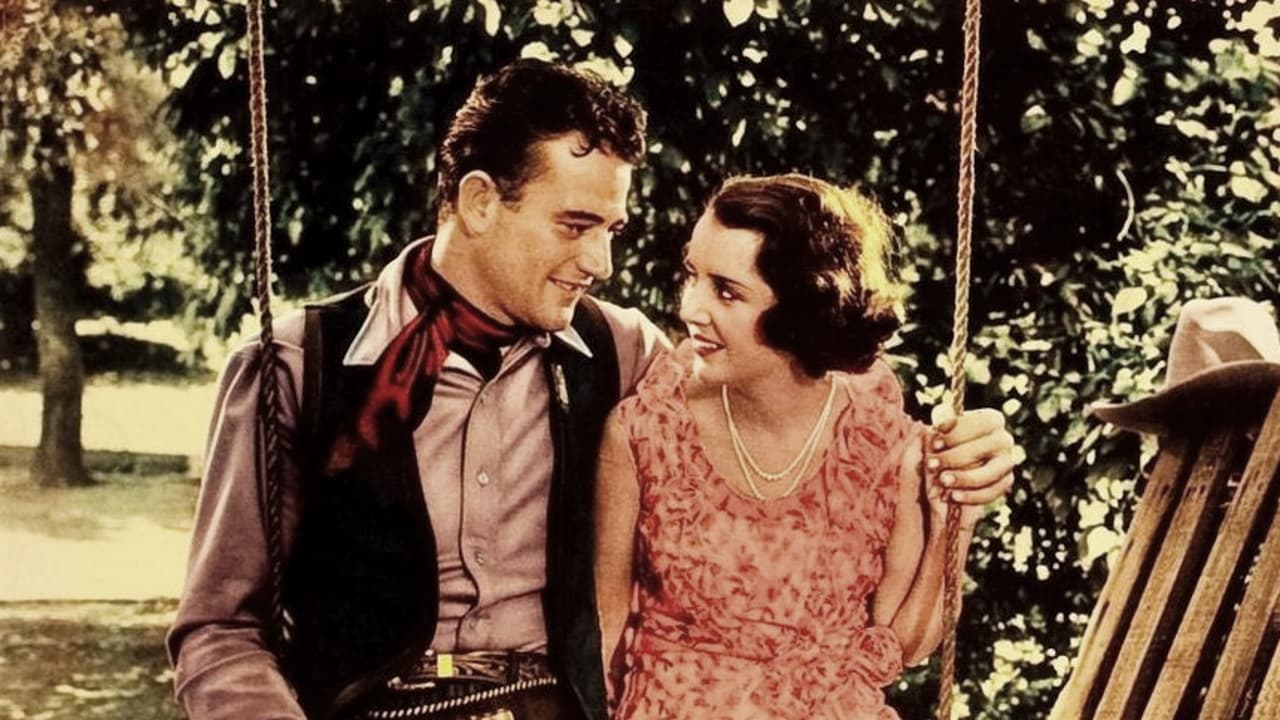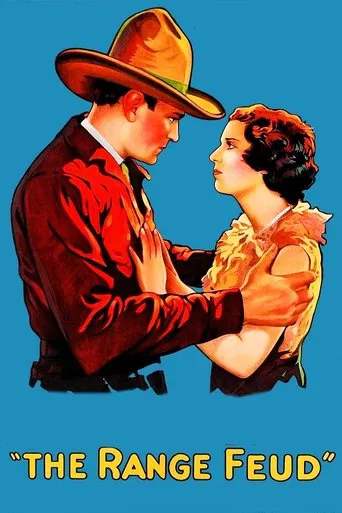

SYNOPSIS: Sheriff tries to keep peace between two warring cattlemen. COMMENT: We have John Wayne's popularity to thank for the video release of this unusual item. (A good print too). I have remarked before that all Buck Jones' films are worth seeing and that many of them are quite unusual. Range Feud bears out that statement. What other westerns can you cite that start right off in a church? What other early sound westerns are so gripping and make such astoundingly smooth use of sharp editing and cross-cutting and pacily employ such realistic sound effects that the complete absence of background music is undetectable? What other westerns have such a grittily realistic mood and atmosphere? And in what other westerns can you find John Wayne playing the romantic lead but not the hero?It's hard to believe that this often stylishly directed piece had any connection with the usually pedestrian D. Ross Lederman. Or that a movie of such expertise could lie forgotten for so long in Hollywood vaults. For instance, Don Miller mentions the movie only in passing (because of Wayne's subsidiary role) in his marvelous book Hollywood Corral.
... View MoreThe Range Feud (1931) ** (out of 4) Standard "B" Western has Buck Jones playing Sheriff Buck Gordon who finds himself in the middle of rival families battling over land. Soon Clint Turner (John Wayne) is accused of killing the father of the rival family and Buck must race to try and clear his name.THE RANGE Feud really isn't any different than countless of other Westerns that were made during this era. Heck, even by 1931 standards the film is pretty old-fashioned and using clichéd tricks that went out of style in the silent era. With that said, the film will contain a little interest thanks in large part to Wayne having a small role. While the film is mildly entertaining in its own way, can you really say people would be watching it today if it wasn't for Wayne? The biggest problem is the fact that this is pretty much like any other cheap Western. The filmmaking is "good" enough to get a decent looking film on the screen. The story is your typical Romero and Juliet type of story dealing with a rivalry and murder. Jones makes for a good lead and I thought Wayne was pretty good in his small role. What else can really be said? If you're a fan of these types of films then it's worth watching.
... View MoreThat phrase (above) by another reviewer summed it up so well, I used it as my summary.I first saw Buck Jones movies on the Internet Archive (archive.org), and I generally like his flicks -- especially "Shadow Ranch," a nifty little unconventional Western.This movie was made in 1931, so it's a little less sophisticated (plot-wise and acting-wise) than later Westerns might be. Occasionally an actor will deliver a line in a sort of melodramatic, "Perils of Pauline" manner.But for the most part, it's a good job done by all. John Wayne especially has a natural, winning manner, never melodramatic. The female love-interest, too, gave a good, natural performance, as well as Buck Jones.One thing puzzled me -- at one point the heroine goes into a back room, then comes out and says (approximately), "I just called the doctor, and he'll be over soon." Was that a clinker by the writers, indicating she used a telephone? I don't think this movie is intended to be in that "cusp" period, 1890's or so. (When DID telephones appear?) One thing I heard differently from another reviewer -- after the "peace service," the man says it's NOT Sunday. He says, there's no reason he shouldn't go to the saloon, because it's not Sunday. Though the archive.org version is pretty choppy, and it's easy to miss a word.All in all, not the most exciting Western ever to come down the dusty road, but good solid viewing at a good Luby's price (so to speak).Spoiler: the Duke is innocent.
... View MoreCompetent little "B" oater with Buck Jones as the heroic sheriff and John Wayne as his friend falsely accused of murder. When you see Harry Wood's name in the cast, it doesn't take long to figure out who is behind all the rustling and killing.This was one of the Duke's first westerns following "The Big Trail"(1930). It was the beginning of a long apprenticeship in the "B" western field. His parts became increasingly smaller in the balance of his work for Columbia due to a conflict with the legendary Harry Cohn, Head of the studio.On the video release issued by Columbia/Tri-Star Home Video notice the title card at the beginning. It gives the title as Range Fued. How did that one ever get by the quality control people?
... View More